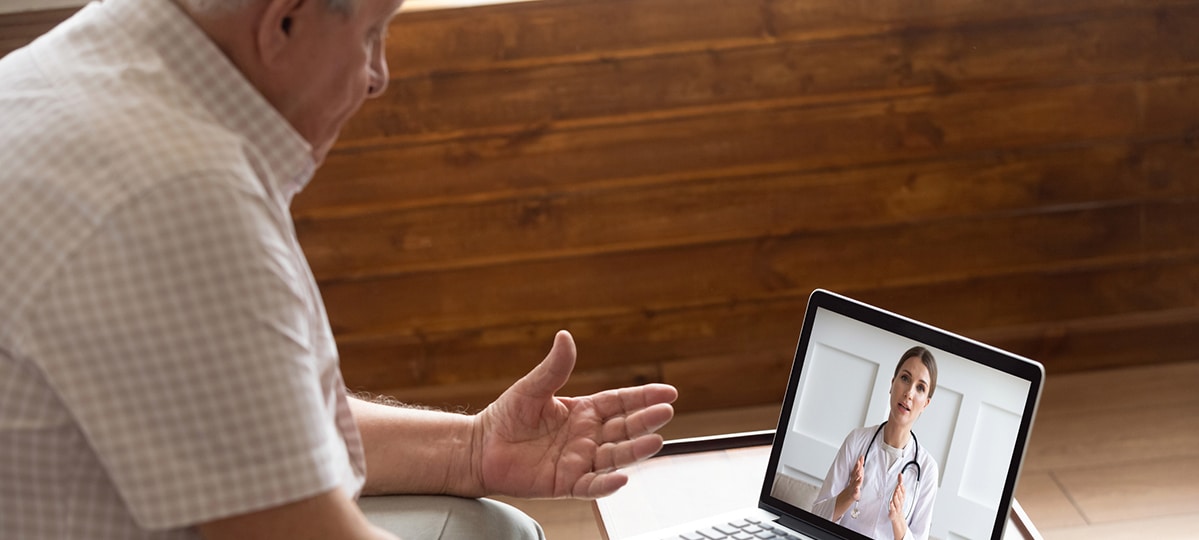Telehealth has played a critical role in the delivery of healthcare during the COVID-19 pandemic, especially for seniors. With stay-at-home orders and social distancing restrictions enacted to help reduce the spread of the virus, telehealth has helped seniors safely and effectively get the care they need without putting them at unnecessary risk. From expanded access to care to greater flexibility, telehealth can provide a tremendous number of benefits for seniors, their caregivers and healthcare providers. Below are just a few examples:
Benefits of Telehealth for Seniors
1. Increased Accessibility
Telehealth delivers a multitude of benefits including increased access to care for seniors and individuals living in rural areas, chronically ill patients and those with limited mobility. Teleconsultations and remote patient monitoring help seniors avoid unnecessary in-person clinic visits reducing the burden of transportation and minimizing their potential exposure to COVID-19 or other infectious illnesses.
2. Greater Flexibility
Telehealth also offers seniors more flexibility when it comes to healthcare delivery. It can benefit seniors living in rural areas enabling them to receive the care they need without having to travel long distances to the nearest doctor. It can also relieve much of the transportation burden for both seniors and caregivers. For many, chatting with a provider through a video chat, web portal or app may be easier than making a trip to the office, and can sometimes cost less. Telehealth delivers quick access to care in many specialties making it a convenient and flexible option.
3. Supports Independent Living
Telehealth also enables seniors to maintain their independence and enjoy living at home longer. From communicating directly with a doctor through a video chat to the remote monitoring of daily vital signs, telehealth supports independent living while providing peace of mind for seniors, caregivers and family members.
4. Encourages Health Engagement
Telehealth encourages self-directed care and health engagement through enabling seniors to become more actively involved in their health. Whether it is through reporting daily vitals, or engaging with a clinician through a web portal, telehealth requires seniors to become more active members in their care.
5. Helps Bridge Gaps in Care
For seniors and caregivers, telehealth can help individuals successfully age in place while keeping them safe and healthy in the comfort of their homes. It can also help families who live further away, and provide support to a loved one from a distance. Lastly, telehealth offers the peace of mind, knowing that their loved one has the care and assistance they need when they need it.
Overcoming Barriers to Telehealth Adoption
While there are many benefits to telehealth for seniors, there are also some challenges. Some seniors may not feel confident using a computer or smartphone and may feel anxiety toward certain technologies. This can often be addressed by having a friend, family member or caregiver assist or help guide them through the process. It may be helpful to have them write down step-by-step instructions. There are also computer courses seniors can take that can provide some basic technical skills.
Although telehealth is often more convenient, some seniors may prefer a traditional visit to the doctor’s office. For this reason, telehealth can be used as a supplement to in-person healthcare. Seniors who feel more comfortable can see their doctor in person but may also use telehealth to supplement in between appointments and questions.
Getting Started with Telehealth
Below are some ways that seniors can get started using telehealth:
- Learn about telehealth opportunities in your community. Find out if your current healthcare provider offers a web portal service. This is a helpful resource that can be used by patients to review test results, and medical records, schedule appointments and send messages to the doctor. Many clinics now provide this service free of charge.
- Next, inquire if your healthcare provider offers telehealth options such as virtual doctor visits, remote patient monitoring, or other home monitoring devices. You will also want to reach out to your health insurance plan to ensure these options are covered.
- Finally, if you use a telemedicine service, ensure that you inform your primary care physician. It is important that they are aware of any new specialists you consult with or new medications you are taking so that they can properly coordinate your care.
While telehealth offers many benefits, it is important to consult with your primary care physician to see how it can be a part of your healthcare plan.




